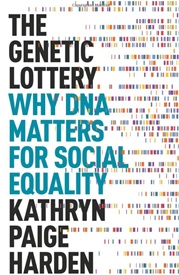The Genetic Lottery: Why DNA Matters for Social Equality

Kathryn Paige Harden
Princeton University Press, £25.00
Do genetic differences impact upon social outcomes and complex human behaviour? Should policy-makers pay more attention to genetic research? These are some of the questions that psychologist Kathryn Paige Harden attempts to shed light on in The Genetic Lottery.
There are two sections in the book, with the first portion looking at what we know about ‘lotteries’ of birth, namely the socio-economic and genetic lotteries, and their relative influence on complex social outcomes. Harden briefly describes the history of genetics, including the association with eugenics and racism. She seeks to “re-envision the relationship between genetic science and equality”.
The second half of the book concerns the vision for a more egalitarian society, and how genetics, in Harden’s view can inform such a vision. Harden’s argument is that we can’t seek to achieve egalitarian outcomes if we don’t account for factors outside an individual control, including genetic differences. She makes an even stronger claim that not taking genetics seriously is “wasting time, money, talent, and tools” in terms of researching things that will decrease inequality. Harden is clear that we should not mistake genetic differences for inherent value of an individual.
The Genetic Lottery is a thought-provoking book, which I felt raised more questions than it answered, particularly around the degree to which genes ‘cause’ complex outcomes. Eric Turkheimer, Harden’s former PhD supervisor, recently asked in what sense can we say that the differences in complex outcomes are ‘caused by genes’. Even conditions with a better-understood causal pathway from gene to outcome, like PKU and short sightedness, have environmental treatments (avoiding phenylalanine and wearing corrective lenses, respectively), and so Turkheimer says that “if you can make it go away environmentally, then it wasn’t based in genes in the first place”.
I wasn’t convinced that The Genetic Lottery really comes to terms with this, admittedly difficult issue. Either way it’s a stimulating read and is bound to provoke debate for decades to come, and for that reason alone is worth reading – this issue isn’t going away.
Conor McCrory MRSB


